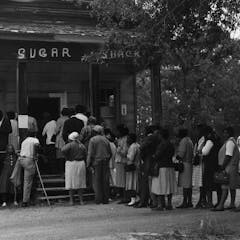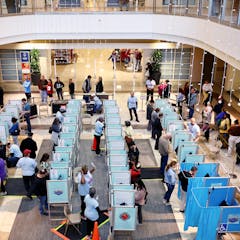
Articles on Voting Rights Act
Displaying 1 - 20 of 31 articles

How does someone with power and fame walk away from it? It’s not easy, as these three examples from politics and sports show.

Historically, federal courts prioritized voting rights and legal congressional districts for upcoming elections above all other concerns. But the Supreme Court changed that in 2022.

The commission has tight deadlines to finalize new maps. 2 voting rights experts explain the messy situation.

The ruling could make it impossible for groups like the ACLU to file lawsuits to protect people’s right to vote – significantly changing how the Voting Rights Act has been interpreted so far.

Since 2020, Alabama lawmakers have failed to draw political districts that give Black voters an equal chance of selecting political candidates that represent their interests.

It’s official: State courts can review lawmakers’ election-district boundary decisions to ensure they comply with state law.

Conservatives and the GOP have mounted a decadeslong legal fight to turn the clock back on the political gains of the civil rights movement.

Any behavior reasonably calculated to dissuade a person from participating in an election is intimidation.

A 2014 US Presidential Commission set a guideline that voters should not have to wait more than 30 minutes to cast their ballots. In some voting districts, it’s taking longer than an hour.

A ruling by the US Supreme Court to allow unlawful maps to be used in the midterm elections will affect who gets elected to the House of Representatives and may determine control of Congress.

Alabama will be allowed to keep a congressional map that critics say disadvantages Black voters. That does not bode well for 2022 midterms, argues a law scholar.

Digging deeply into the nation’s past can help illuminate the racial setbacks facing the US today.

Access to voting materials in a citizen’s native language helps boost involvement and voter turnout.

Following the Sept. 20 federal election, an important question must be asked: How is the Canadian electoral process accommodating the country’s increasing linguistic diversity?

Not all new laws labeled “voter suppression laws” are, in fact, voter suppression laws. An election law expert takes a closer look.

The court upheld two Arizona laws that limit when, where and how people can vote.The ruling further guts the Voting Rights Act at a time when many US states are passing more restrictive voting rules.

In Brnovich v. DNC, the court will decide whether two Arizona rules unfairly hurt poor, minority and rural voters. The ruling could determine the fate of many states’ restrictive new voting laws.

As GOP-run statehouses across the country tighten voting restrictions, a bill in Congress would, its Democratic sponsors say, undo more than 15 years of moves to make voting harder.

The U.S. Supreme Court is considering whether a ban on the third-party collection of mail-in ballots is legal. The practice is allowed in 26 states.

Everyone’s saying it: ‘Democracy is fragile’ in the United States. But a political science scholar says that has always been the case.
